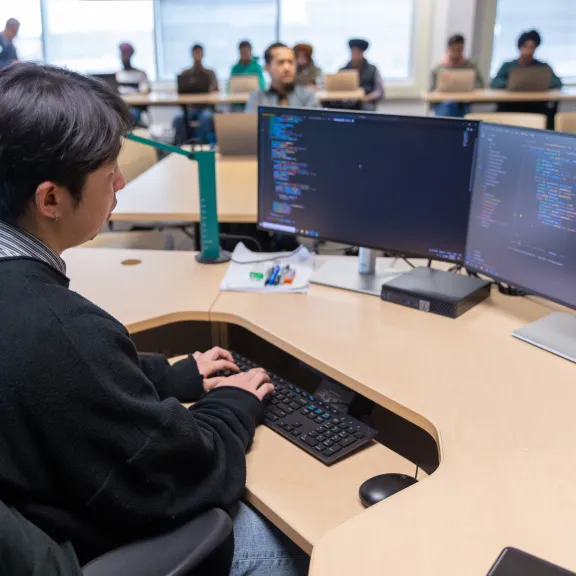
Applied AI Machine Learning Certificate
Build, Train and Deploy AI Solutions that Scale
Develop artificial intelligence skills that translate directly into impact. This certificate in Applied AI combines 240 hours of guided learning across four focused courses with hands-on labs and collaborative projects to ensure that you can:
- Master Python and foundational AI concepts through practical exercises
- Build, train, evaluate machine learning modules with industry-leading libraries
- Deploy scalable AI solutions on cloud platforms and manage them with DevOps best practices
- Explore generative AI architecture to create intelligent applications from chatbots to image generators
Program Delivery
You will complete four courses as part of the certificate, with each course taking 60 hours to complete. There are three different delivery options:
Full-time Days:
- Three months to complete
- Monday-Friday 11:00 am - 4:30 pm
Part-time Evenings:
- Six months to complete
- Monday, Wednesday, Saturday 6:30 pm - 9:30 pm
Part-time Weekends:
- Four months to complete
- Four weekends per course
- Saturdays 8:30 am - 4:30 pm

Ideal For
Those looking to upskill current technical or executive leadership skills
- Software developers
- Technical advisors
- Technical planners
- Data scientists or those interested in data science
- Business intelligence analyst
- Executive leadership who make or provide reporting for data driven decisions
Admission Requirements
There are no admission requirements for this program. But it is advisable to have a background in technology, including basic programming skills, or executive leadership training, or business training.
Technology Requirements
A computer/laptop with internet access and the ability to download free software.
Graduation Requirements
You must complete all courses with a minimum of 65% in each course.
Program Costs
Note: there may be incidental software usage charges incurred as part of the program.

Financial Aid Options
Student life can be very expensive, and few individuals have enough money to pay up-front for their post-secondary education.
Students enrolled in continuing education programs may qualify for program-dependent funding opportunities.
Courses
Foundations of Python Programming
This course introduces Python programming fundamentals. You'll be equipped with essential skills for data handling and visualization
- Python Fundamentals, Data types, loops, conditions, algorithms and logical operations
- Functions – parameters, calling
- Object Oriented Programming
- Data Handling
- Data Manipulation and Visualization
Machine Learning
This course builds on Python skills to explore machine learning, covering algorithms, evaluation, and introductory deployment techniques, preparing you for real world ML applications.
- Machine Learning Foundations – probability, distributions, bias-variance, overfitting vs underfitting, cross validation techniques
- Supervised Learning – Linear, regression, logistics regression, decision trees, gradient boosting, vector machines
- Evaluation metrics, precision, matrix analysis
- Unsupervised Learning – clustering, dimensionality reduction, anomaly detection
- Deploying and monitoring ML models – serverless, API -based, tools.
- Neural Networks
- Model Productionization – data pipelines, tools, API serving, Monitoring
ML Ops and Cloud Infrastructure
Machine Learning (ML) Ops is an introduction to the processes used to develop, deploy and manage Machine Learning development and operations.
- Define and identify tools for ML Ops
- Versioning and applying model tracking techniques
- ML Infrastructure on the Cloud
- CI/CD (process automation) and integration testing
- Practical implementation
Generative AI
This course explores generative AI, focusing on large language models, prompt engineering, and practical applications like chatbots and image generation, building on prior ML and deployment knowledge:
- Generative AI concepts and applications – ethical considerations
- Large Language Models
- Prompt Engineering
- Generative Applications
- Neural Networks
- Model Productionization